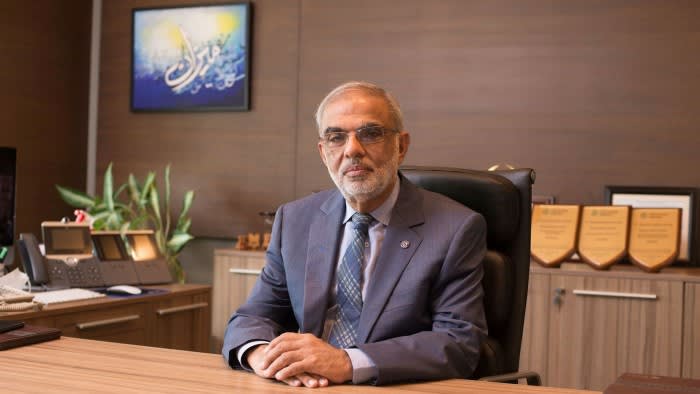Unlock the Editor’s Digest for free
Roula Khalaf, Editor of the FT, selects her favourite stories in this weekly newsletter.
Meezan Bank, Pakistan’s leading Islamic financial institution, has cemented its position as the country’s most valuable lender after its shares surged and the bank profited from consumer demand for sharia-compliant finance and high interest rates.
Meezan earned record after-tax profits of Rs84.5bn ($305mn) last year, an increase of 88 per cent on the year before, part of a sector-wide boom in earnings from government debt at a time of high interest rates.
After-tax profits at Pakistan’s oldest Islamic bank rose 34 per cent in the nine months to the end of September to Rs78.8bn, according to results released in October. The bank’s shares have risen about 80 per cent in the past 12 months, giving the bank a $1.5bn market capitalisation.
Pakistan has set a target of having a fully Islamic banking system by the end of 2027, spurred by a 2022 ruling by its federal sharia court to eliminate interest from the economy within five years.
While most bankers and policymakers said it was unlikely that the country would meet this goal — sharia-compliant banks’ deposits represent just a quarter of the sector — they said Islamic banking was gaining momentum.
“There is a very large untapped demand in the market for Islamic finance in Pakistan, and the conventional banks are starting to see that, too,” said Saleem Ullah, a deputy governor of the State Bank of Pakistan, the country’s central bank. “In the next 10 years, you could see the bulk of the banking sector transformed into Islamic [finance].”
Islamic banking prohibits charging riba, the taking and receiving of interest on loans. To earn money, the bank uses different equity participation systems for borrowers to pay back loans, such as profit sharing and lease payments.
Irfan Siddiqui, Meezan’s chief executive and founder, said the bank had tapped into the unmet needs of Pakistan’s majority Muslim population of 250mn.
“In general, a Pakistani Muslim will prefer an Islamic offering over a non-Islamic one,” he told the Financial Times during an interview at the bank’s Karachi headquarters.
Siddiqui said the bank’s strategy had always been to target the vast slice of customers who were “religiously inclined” but wanted “the same or better services as our conventional counterparts”.
Meezan’s windfall came after it invested in government sukuk, a sharia-compliant alternative to Treasury bills. Sukuk bonds are based on an underlying asset, such as land or companies, but are in practice roughly tied to the interbank interest rate benchmark of around 13 per cent.
Since Meezan and other Islamic banks have a no-interest rule, they do not have to offer a minimum rate of return on savings deposits, allowing them to keep more of the returns from sukuk bond payments.
That advantage produced the “exceptionally high spreads” that have driven Meezan’s rise to the top, said Sana Tawfik, an analyst at brokerage Arif Habib.
Pakistan’s banking sector has been enjoying soaring profits on interest from mounting government debt after the central bank raised interest rates to as high as 22 per cent over the past two years to curb inflation. Government paper has remained a liquid and risk-free path to net interest income for the banks.
However, the exceptional growth of Meezan, which has held the title of Pakistan’s most profitable bank since 2022, has brought the Islamic banking sector under scrutiny.
“Under the ambit of Islam, [Islamic banks are] taking people for a ride,” said Saleem Mandviwalla, chair of the finance committee in Pakistan’s senate.
According to a September analysis by Pakistan’s senate secretariat, Meezan had a net interest margin of 8.8 per cent in 2023, compared with an average of 4.8 per cent for non-Islamic banks.
Mandviwalla has promised to introduce regulations that would close the margin advantage enjoyed by Islamic banks and “keep them at par” with conventional banks.
Siddiqui rejected Mandviwalla’s criticism of profiteering, pointing to Meezan’s cost-conscious management style and “divine help” as the reasons for their rapid success.
Meezan had a cost-to-income ratio of 29 per cent in the first nine months of this year, far lower than its peers, including other Islamic banks. It also enjoys a non-performing loan ratio of about 1 per cent, the lowest in the entire industry, according to Karachi-based brokerage Topline Securities, despite lending out a larger share of its deposits to the private sector than most other large banks in the country.
Decisions made by the company’s management are done in consultation with an in-house sharia supervisory board, led by one of Pakistan’s most famous religious scholars Muhammad Taqi Usmani.
Siddiqui said he was not worried about competitors. The bank’s share of the country’s Islamic finance market has held steady at about a third in the last decade, despite more competitors entering the sector.
The chief executive added that it was his duty to proselytise sharia-compliant finance: “We got into this business for the ethos, and I think that’s why we have been blessed with this performance.”

















